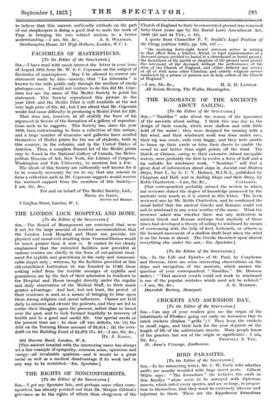THE IGNORANCE OF THE ANCIENTS ABOUT SAILING.
[To the Editor of the SPECTATOR.] SIR,—" Nautilus" asks about the reason of the ignorance of the ancients about sailing. I think this was due to the design of their vessels, which were shallow and with little hold of the water ; they were designed for running with a fair wind, and their windward work was done under oars, their rig was crude, sails very baggy, and they were unable to brace up their yards or trim their sheets to enable the vessel to sail better than eight points off the wind. The Dutch or Chinese, owing to their extensive inland navigable waters, were probably the first to evolve a form of hull and a rig suitable for windward work. " Nautilus " will find a great deal of information about ships in Ancient and Modern Ships, Part I., by G. C. V. Holmes, M.I.N.A., published by Chapman and Hall, and in Sailing Ships and their Story, by Keble Chatterton.—I am, Sir, &c., CATALONE.
[Our correspondent probably missed the review in which our reviewer stated the degree of knowledge possessed by the ancients very much as it is stated in this letter. The book reviewed was by Mr. Keblc Chatterton, and he confirmed the usual belief that the ancient Greeks and Romans could not sail to windward in any sense worthy of the name. What the reviewer asked was whether there was any indication in ancient Greek and Roman writings that anybody of those times had developed a theory of sailing to windward by means . of overcoming with the help of keel, leeboards, or otherw:se the leeward movement of a shallow draft boat when the wind is on the beam or ahead. The Greeks theorized upon almost everything else under the sun.—En. Spectator.]


































 Previous page
Previous page